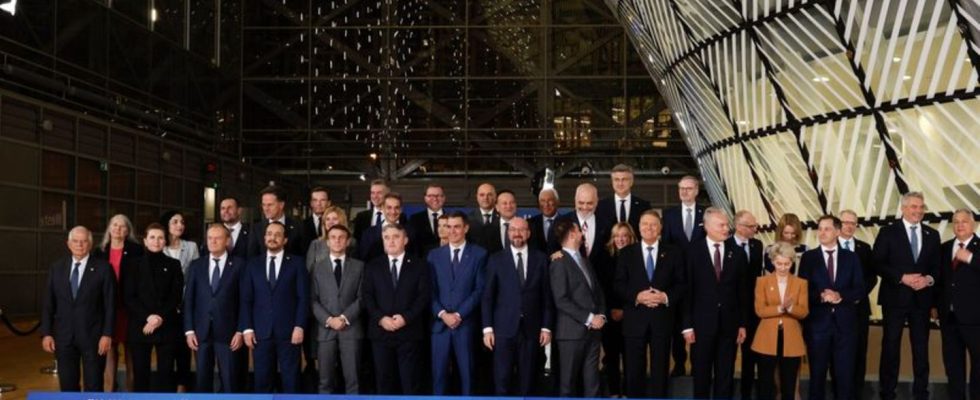Accession process
EU calls on Balkan countries to reform at summit
The traditional group photo of the heads of state and government of the European Union and the Western Balkans in Brussels. photo
© Omar Havana/AP/dpa
Like Ukraine, Balkan countries such as Albania and Montenegro hope for a future in the EU. Is this realistic? At a summit in Brussels there are clear announcements on the subject.
The heads of state and government of the EU states have asked their colleagues from the so-called Western Balkan countries to make decisive reforms for a rapid rapprochement with the European Union called. A declaration adopted at a summit in Brussels on Wednesday evening said that accelerating the EU accession process was in both sides’ interests.
The increasingly complex geostrategic environment with Russia’s war of aggression against Ukraine and the crisis in the Middle East endangers European and global security and highlights how important the strategic partnership between the EU and the Balkans is.
The rule of law and the economy are named as important areas for reform in the declaration. The EU also emphasizes that efforts are needed to combat corruption and organized crime, as well as increased support for human rights and gender equality, for example. After the meeting, EU Commission President Ursula von der Leyen emphasized that reforms would also involve additional investments from the EU. That is the principle.
Not much progress recently
The heads of state and government of the countries of Albania, Bosnia-Herzegovina, Montenegro, Serbia, North Macedonia and Kosovo were invited to the summit. They are all considered so-called Western Balkan countries – a political term of art. Basically, the European Union wants to bind everyone more closely to itself. However, despite billions of euros in financial support, no major progress has been recorded recently.
Brussels sees Montenegro as furthest along in the accession process. However, EU enlargement is currently not expected until the end of the decade at the earliest. The EU has been conducting accession negotiations with Montenegro and Serbia since 2012 and 2014 respectively. Albania, North Macedonia and Bosnia-Herzegovina have candidate status but are not yet in negotiations. Kosovo is a potential candidate for membership.
Orban wants to block accession negotiations with Ukraine
The summit was overshadowed by Hungarian Prime Minister Viktor Orban’s decision to initially block EU decisions to start accession negotiations with Ukraine. This is currently linked to a preliminary decision for the start of accession negotiations with the Balkan country Bosnia-Herzegovina.
Following the Balkans meeting, the heads of state and government of the EU states will meet this Thursday and Friday for the last regular EU summit of the year. The question is whether EU accession negotiations should be started with Ukraine and Moldova. Plans for a revision of the EU budget for the years 2021-2027 will also be discussed. For Germany, Chancellor Olaf Scholz is expected to attend the summit in Brussels.

